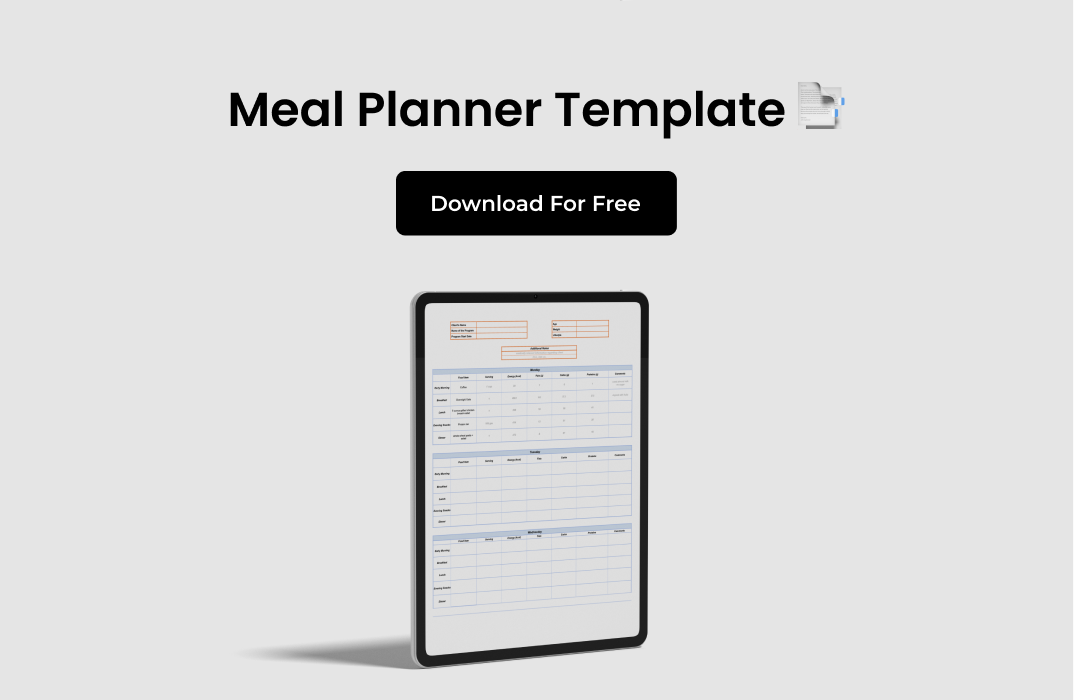Are You Earning Up to Your Potential?
Most personal trainers are undervaluing their time and skills. Our Personal trainer Revenue Calculator helps you find out what you should be making, and how to get there.
No guesswork. Just real numbers.
.jpg)
Introduction
We all know that healthy eating is essential for a fit lifestyle. But it is important to understand why it is so important. In today’s fast-paced society, many people eat on the go and rely heavily on processed foods for their meals.
Often clients ask for a meal plan from their personal trainers. Along with a strict exercise routine, they prefer a personal trainer meal plan as well.
Most personal trainers have extensive nutrition, food, and good meal planning knowledge. Some personal diet trainers may be licensed, registered, and qualified to recommend diet plans and medical advice. Personal trainers can provide meal plans, but only under specified conditions.
You probably have many questions when trying to make a meal plan for clients as a personal meals trainer. When should a food plan be developed for clients? Why and how should you consider including this in your list of offerings?
Continue reading to find the answers to these questions and discover how to begin offering meal planning advice.
We at FitBudd have got a present for you. Get a FREE Meal Planner template—with added recipes and food items—to share with your clients. And if you want to go beyond templates, tools like nutrition coaching software can help personal trainers create, deliver, and track client meal plans at scale.

Different Types of Meal Plans
Meal planning can be divided into three categories: calorie-based, macro-based, and portion-based.
Calorie Counting
Meal plans that are calorie-based advise customers on how many calories to consume. It is one of the most widely used methods since it is effective even without exercise.
Before recommending a calorie intake plan, find out more about the clients. Age, height, weight, gender, BMI, and degree of activity are important factors to take into account while creating such a strategy.
Macronutrient Plan
In addition to counting calories, macro-based plans assist clients in balancing their intake of macronutrients. These plans divide food into three macronutrients: protein, fats, and carbohydrates. Instead of just hitting a specific calorie count, they count macronutrients to ensure that your clients get enough of each type of calorie.
Also read: Plant-Based Diets for Athletes: A Comprehensive Guide for Fitness Professionals
Portion Control
Finally, plans that include portion size are effective for people who want to plan and prepare individual meals. They assist clients in distributing macros throughout the day to ensure even nutrition. This promotes regular digestion and keeps their bodies active at all times.
The primary distinction between counting calories and selecting a different method for regulating portion size is that the former gives clients another way to acquire information about caloric consumption.
Also read: What's An Ideal Trainer’s Diet Plan? A Quick Overview
💪 Got an idea for a brand? Let's bring it to life.
Launch your own fitness app with FitBudd in minutes!

💪 Got your brand name? Let’s bring it to life.
Launch your own fitness app with FitBudd in minutes!


88% trainers worldwide gave us 5 stars
Transform your fitness business with the power of your branded app on iOS and Android.
Try for FREE
How to Create an Effective Meal Plan for Clients
The first step toward creating a meal plan for clients is an assessment. Ask the following questions:
- What fitness objectives do you have? (Losing weight, gaining muscle, getting in perfect shape, lowering the risk of developing specific genetic diseases like diabetes or heart disease, etc.)
- Have you ever had a food allergy?
- Do you follow any particular diets, such as a kosher/halal diet, a vegan or vegetarian one, or a ketogenic one?
- What is your typical grocery budget? (Assuming you don't supply the ingredients)
- Do you have any particular foods that you love or hate?
All these things will help you determine what you want to achieve.
1. Create the Plan
Then you can make a realistic food plan that considers the client's requirements and objectives. You'll choose which of the three types of meal plans you want to use at this time.
Pick a planning strategy that will benefit your client the most. Create a monthly template with options for meals and snacks. Your customer will be flexible because they can fit any of these meals into their daily schedule.
They can choose the things they feel like eating on any given day more readily if they choose from a list. The food plan will then seem less intimidating to them.
2. Provide Ingredients Lists and Recipes
To fit your meal plan, your clients will probably need to make some challenging lifestyle changes. If they have to implement and use new recipes, this is challenging and might even be overwhelming. Giving them weekly shopping lists and some delectable recipes they can try to cook with those products can help the process go more smoothly.

3. Encourage Weekly Prep
Because of their hectic schedules, your clients most likely won't have time to make wholesome meals every day of the week. When they have free time, you can urge them to prepare their meals once a week. Inform them of the meals that will stay fresh for longer and discuss the food that may be frozen for later consumption.
4. Continuously Evaluate and Adjust
You'll need to periodically evaluate your clients' meal plans because you'll probably continue to work with them in the future. As they move closer to their objective, assess their progress and refine their plans. Check-in to determine if the meal plan is realistic for them to follow, and if not, make any necessary changes or requirements.
Meal Planning Tips for Personal Trainers
Finally, think about this advice for trainers on food preparation:
- Maintain a positive business attitude.
- Not being qualified to give medical advice prevents you from doing so.
- Suggest additional qualified specialists to clients (especially those with specialized dietary needs)
- Start slowly with only partial meal planning.
- Avoid making things too difficult for clients to comprehend or follow the plan.
- Educate your clients about the reasons behind the program's appearance.
- Obtain feedback from clients to better understand their needs.
Following these suggestions will make it much simpler for you and your clients to keep to the meal plans you create together.
Personalized Plans for Medical Conditions
While general meal plans like calorie-based or macro-focused options work for many, some clients require personalized nutrition due to chronic health issues. For example, individuals recently diagnosed through a Crohn’s disease test may need customized meal plans that avoid common trigger foods and support gut health. Similarly, those managing IBS or celiac disease require careful dietary adjustments that go beyond standard nutrition guidance. In these cases, it’s essential to stay within your professional boundaries and collaborate with a registered dietitian or healthcare provider. Your role as a trainer can still add value by helping clients structure meal timing, prep routines, and food journaling practices that align with their medical dietary needs.

How much can you charge for Meal Plans?
It's up to you how much you bill for meal planning services. $80-$100 might be a reasonable price range for your services if you have the necessary medical expertise and are licensed to prescribe meal plans. You might only want to charge $40–$60 if you're a personal trainer giving unlicensed advice.
Additionally, you can charge clients who purchase additional services less than those who merely want meal plans. Offer a 10–20 percent discount on meal planning services to anyone already collaborating with you on an exercise regimen. This will motivate people to work with you simultaneously for several fitness-related goals.
Conclusion
For many personal trainers, the following step may seem challenging: offering nutritional guidance. However, giving meal plan recommendations can assist you in advancing fitness coaching. Potential clients will likely choose your brand over rivals since you provide comprehensive services and have high levels of knowledge.
Also read:
Frequently Asked Questions

Meal Planner Template
Take control of your nutrition with our easy-to-use meal planner template, designed to simplify healthy eating.
Download Now
Templates
These functional templates have the power to make any fitness trainer's life easier.
Subscribe To
Our Blog




















%20for%20Fitness%20Trainers-1-min.jpg)












